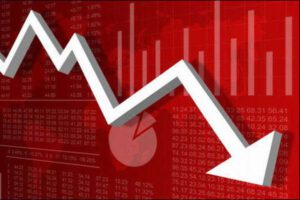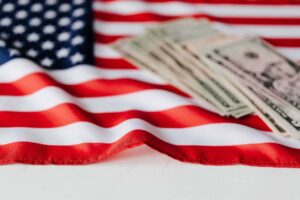
Estimates of the likelihood of a recession in the US economy have risen sharply amid high inflation and rising interest rates in the US, according to a regular poll by The Wall Street Journal.
Respondents estimated the probability of a recession in the US in the next 12 months at 63% against 49% in July. The indicator exceeded 50% for the first time since July 2020. The WSJ data since 2005 show that experts’ assessment of the chances of a recession at this level in rare cases did not correspond to a real recession.
The survey was conducted October 7-11 among 66 economists.
On average, respondents forecast a 0.2% annualized decline in US GDP in the first quarter of 2023 and a 0.1% decline in the second quarter. The July forecast called for growth of 0.8% and 1%, respectively.
Companies will respond to the shrinking economy and their profits by firing employees, experts say. According to them, the number of jobs in the US with the exception of the agricultural sector will decrease by an average of 34 thousand per month in the second quarter of next year and by 38 thousand in the third quarter. Previously, it was expected that in these six months the number of jobs will grow by an average of 65 thousand monthly.
Economists are increasingly skeptical about the Federal Reserve’s ability to keep raising rates to slow inflation without triggering a rise in unemployment and a recession. About 59% of analysts polled fear that the Fed will raise rates too high from 46% in July.
“A soft landing will most likely remain a fairy tale that will never come true,” said Daniil Manenkov, an economist at the University of Michigan.
“The negative impact from rising rates and a stronger dollar is huge and will cost about 2.5 percentage points of GDP growth next year,” said Aneta Markowska, senior economist at Jefferies LLC. “.
At the same time, the recession will be relatively short, experts believe. Those economists who estimate the probability of a recession higher than 50% generally believe that it will last 8 months. The average duration of US recessions after World War II is 10.2 months.
In 2023 as a whole, the United States economy will grow by 0.4%, in 2024 – by 1.8%, according to the consensus forecast. Economists expect growth of 0.2% this year.
Unemployment in the United States, according to the average forecast of experts polled by the WSJ, will increase from September 3.5% to 3.7% by the end of 2022, then reach 4.3% by July and 4.7% by December next year, after which it will hold around this level throughout 2024.
“The Fed is choosing the lesser of two evils – a recession and rising unemployment now or the risk of more destructive and persistently high inflation in the future,” said KPMG’s Diane Swank. “The risk of error is very high.”
The Fed raised the key interest rate by 75 basis points in the last three meetings, and now the rate is 3-3.25%. September inflation in the United States beat forecasts at 8.2%, which almost certainly means that the Fed will raise rates again in November by 75 bp.
By the end of this year, the rate will rise to 4.267%, according to the consensus forecast of economists polled by the WSJ, and the peak value of 4.551% will reach next June. At the same time, about 30% of respondents believe that the Fed will start cutting rates as early as the fourth quarter of 2023, and 28% expect a reduction in the first quarter of 2024.

The US economy will enter a recession next year amid higher Federal Reserve (Fed) rates, Deutsche Bank economists David Folkerts-Landau and Peter Hooper believe.
“The US economy will take a big hit from additional Fed tightening in late 2023 and early 2024,” analysts said in a report titled Over the Brink.
In their opinion, the Fed will raise the key rate by 0.5 percentage points at the next three meetings, and by mid-2023 the rate will exceed 3.5%. The current target range for the federal funds rate is 0.25-0.5%.
In addition, by the end of next year, the Fed will reduce the amount of assets on its balance sheet by almost $2 trillion from the current $8.9 trillion, Deutsche Bank experts predict. For monetary policy, this is equivalent to another 3-4 rate hikes of 0.25 percentage points, Bloomberg quotes economists.
Deutsche Bank predicts that by the summer of 2023 the US stock market will fall by 20%, and the yield on 10-year US government bonds will rise to 3.3% at the end of this year. Unemployment in the United States in 2024 will jump to 4.9% from 3.6% in March, economists expect.
“Our forecast for a recession in the US next year so far differs sharply from the consensus,” the authors of the report admit. “But we believe that this will soon change.”